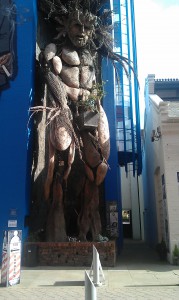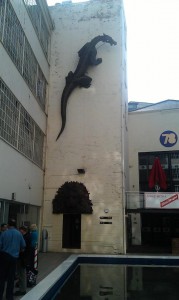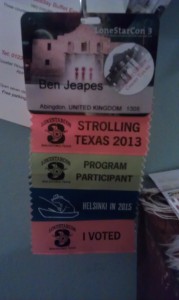 Good reviews, from readers you’ve never met before, and who get everything you’re trying to do, and for whom you’ve ticked all the boxes, are beyond rubies.
Good reviews, from readers you’ve never met before, and who get everything you’re trying to do, and for whom you’ve ticked all the boxes, are beyond rubies.
Author Archives: Ben
Schola Nostra Sedes
Be warned, this is a long post. Last weekend, BBC2 broadcast A Very English Education, looking back at a 1979 documentary filmed at Radley College, and catching up with some of the boys they had filmed. It reawakened memories of my own public school experiences…
I have to say, I hadn’t realised quite how relatively progressive Sherborne was. We were allowed comics (2000 A.D.! If I had been denied that, maybe I would now be as successful as James Lovegrove). We didn’t have to wear jacket + tie + scholastic robe … though Radley is of course within spitting distance of Oxford, and being as snobbish as most public schools I suspect it was easily over-awed by and trying to emulate superior rank. We even saw girls from time to time, from the girls school, dressed in uniforms scientifically designed to be as unsexy as possible.
But for all that …
I didn’t write everything below since yesterday; it was previously written and looking for the right time and occasion. So here it is. And if you’re really into the public school zone, check out my story “Pages out of order” (Fantasy & Science Fiction, September 1997). So far boys from three different schools have all told me they recognise their old place …
* * *
Prep school was all contained within one house. Sherborne had nine boarding houses scattered around town, never more than a brisk five minute walk away. The centrepiece of the entire town is the sandstone Norman abbey. The school, which had already existed for centuries, was given its official charter by Edward VI and grew out of the old monastic community on the abbey’s north side. The courts, a wide open, gravelled spaced, are the core of the school. Around them are most of the classrooms, the library, the chapel, the administrative buildings and the original School boarding house. A mini-campus spreads away from this core, gradually merging with the rest of the town. This contains the science and arts blocks, the sports centre, various theatres and music schools and of course the gloriously (and accurately) named Central Feeding. Quite recently, in my time, boys had eaten their meals in their houses as well as studied, slept and lived generally. Now the Feeding was officially Centralised.
The school is entwined inextricably with the town, like tares and wheat growing in the same field. The roads through the school centre are public rights of way. Thus at any time of day, if not actually sitting in a classroom, you are likely to see other people. Just by its very being, Sherborne begins to tear down the barriers put up by an insular little prep school set in its own grounds.
I got off to a good start – or rather, didn’t – with the New Boys Test. This varies from house to house and year to year – there is a general format that covers things it really is necessary for a new boy to know, but also a good deal of leeway allowed to the prefects who set the questions. There are things like the names of the houses plus their colours and the shorthand letters that identify them, names and nicknames of the housemasters, and words and tune of the school song. (Which I still know, in Latin, including the rousing chorus of ‘Vivat Rex Eduardus Sextus!’. Even at the age of 13 this struck me as lagging a little behind current affairs.) Who is the head of which department; where is such-and-such classroom … useful stuff. Then it got a little more arcane, with the complex system of colours, socks, scarves and blazers that designated the various teams and which I never got the hang of, or interested in, in five years. (As I can rattle off the ranks and insignia of several armed forces around the world, plus several generations of Starfleet (sad but true), this shouldn’t have been a problem: the difference is probably that I care, or have cared, about these whereas I couldn’t give a syphilitic monkey’s shrivelled left testicle for the games outfits and their significance.)
And then there were the unique variations introduced by the prefects. In our year, for instance, there was a curriculum of questions based on a set text taken from a porn magazine.
The system in my house, Westcott, ground to a shuddering halt in my last year when prefects drawn from my contemporaries set the questions. New boys were apparently required to demonstrate how to masturbate, using a bottle as a prop. One boy’s slightly garbled account to his parents suggested he had been told to masturbate into a bottle. The phone line to the housemaster glowed red hot and furious. Thereafter, I believe, the housemaster set the questions himself.
I failed the New Boys Test, and I failed the one permitted retake. The punishment for this – and a good many other things – was Calling. You dress up in your suit and wake the prefect on duty first thing in the morning, who then supervises you having a cold shower for an arbitrary period. Then you change into your games clothes, have another cold shower, change back into suit, another cold shower … I forget how many cycles this went through, and it probably depended on the prefect in question. I managed to irritate mine by taking too long between changes; he was furious to find I was actually drying myself before putting on the next set of clothes.
But this was a mild inconvenience, no more. You didn’t have to do a second retake of the test; you were just officially written off as useless, which suited me fine. I could get on with my life and all the other things I was useless at.
Like, sport.
No one, even once in the ten years of my private education, took the time to sit down with me and try and enthuse me about sport: maybe explain why it was desirable to be good at it, how I might have a future in it, in what ways a sporting ability could be cultivated. Instead, my ability and interest were simply taken for granted. It was always just assumed that I would enjoy it and be good at it. Why? Why is it remotely important how good someone is at kicking an inflated bladder around a field? More often than not in the freezing cold and pouring rain? Why?
To this day, I remain in near-complete ignorance of the sporting world. Unless it’s seriously intrusive upon normal TV viewing schedules, for example Wimbledon or the Olympics, I generally don’t even know that some great event or other is happening. Nor am I the least bit interested when I find out.
Oh, I could do it. I could go into the second row of a scrum – which I’m sure contributed to chiropractic problems that last to this day – and have my head ground between the forwards’ pelvises, but strangely I never did enjoy it (if God meant the second row to exist, why aren’t human skulls made of steel and why don’t sweaty rugby shorts smell nice?) and my motivation was zero.
I had guessed Sherborne would be different to prep school, the work harder. But then, prep school had got gradually harder too, at a reasonably challenging rate as you got older. I had never been academically great, but not academically bad either. I had just about got the balance between my natural laziness and the demands of school work. So, I projected ahead on the curve that had already been established, and I catastrophically didn’t disengage my prep school cruise settings until much too late.
Time and time again I simply failed to realise how much work something would be and didn’t allow enough time to do it well. Science in particular was very different. Chemistry at prep school had been about mixing up saturated solutions of copper sulphate and making crystals on bits of string, or bubbling CO2 through limewater to see what happened. Chemistry at Sherborne was about atoms and protons and electrons and molecules. I simply didn’t pay enough attention in the first few lessons that laid the groundwork, and I set myself back for the next three years, when I could finally scrape an E at O-level and give it up forever.
Maths was just more of the same, but ratcheted up a level. Likewise French and Latin, with more complex translations and more words to learn, which I didn’t bother learning because I thought I knew them. The only subject I could take and run with was English.
The punishment for sloppy work, where the potential for doing better was detected, was a blue – usually a repeat of the assigned work, initialled by the housemaster at the start and the end of the job to show he was aware of it. The date of the blue given was noted down on a copy of the house list in the housemaster’s study. Most names had a few against them; for me, they had to start a new line.
The situation could be recovered, and it was, by the penny dropping and my starting to work. Slowly, but surely, I lifted myself off the bottom. My marks improved. Chemistry was the only subject in which I remained rubbish. I must have done better in the other sciences because grading for the six classes of the Fourth Form, 4S1 through to 4S6, was based upon your ability in science –– and at the end of the first year I learnt I was to go into 4S4. In other words, there were two whole classes of boys who were worse at science than I was.
After a shaky start, I finished my Third Form year feeling pretty good. Going back to school in September 1979 was like slipping on an old glove. It was familiar and comfortable, but best of all, we were all one year older and several inches taller than the new batch of squeaky voiced Third Formers.
So, by and large I was happy at Sherborne. Most people appreciate honest effort and integrity, and public school is no different. I was useless at games, but I still tried. I took up scuba diving and joined the CCF; neither of which would ever be ways into the heart of the Westcott sporting establishment but it still showed a certain effort. In the CCF I rose to the grand rank of Sergeant, with marksman badges in two kinds of rifle (.22 and SLR) and solo glider wings.
I was considerably better off than Smythe.
That wasn’t his name but it’s what I’ll call him. I don’t know why Smythe was so picked on. We were in the same intake for Westcott. He also failed to fit in. Maybe his failure is that he tried, and tried badly, making the failure more noticeable. I don’t know. I do know I didn’t particularly like him myself – too cocky, a sense of humour that I just found immature – but I was always prepared to be civil, to live and let live. Others weren’t, least of all one of the more popular members of our year who was open and unforgiving in his loathing.
Smythe singled himself out within the first week. I didn’t witness the incident but I heard of it; while everyone was joshing about homosexuality (a frequent topic), he said to one boy, ‘do you mind sidling up to me?’ By which he meant, of course, ‘do you mind not sidling up to me,’ but the decision was made on the spot to misconstrue it, and once that happens there is no way back.
Maybe Smythe could have redeemed his own situation with some wise choices rather than the very unwise choices he actually made. He tried to appear cool and the possessor of many cool toys; nothing too flashy – say, a novelty keyring or a rubber stamp that did pictures of a pair of kissing lips. He would pull them out in conversation and play casually with them. Unfortunately it became fairly obvious that he was stealing them from town.
He was rusticated – suspended and sent home – once for this. After our second half term break he simply didn’t come back.
I can forgive Sherborne most things; most of my criticisms of my time there were my own fault, or an institutional failing that you just learnt to live with, or simply the behind-the-times inertia of a tradition-ridden establishment. But just as I think I’m approaching a 100% reconciliation, I remember Smythe, who should have been spotted and saved by the establishment, and wasn’t. And I wonder how many other Smythes there were. Or are. One in every year? At least? Quite possibly.
Ultimately, the ethos of Sherborne was that you sank or swam. I sank a short distance, then struggled to the surface. Smythe never came up.
* * *
I have also prepared notes on another subject I can’t quite forgive Sherborne for. I may post them later.
Cons and pros and cons
Last Saturday saw me at Andromeda One, an inaugural one-day convention held in that there Brum and named for the legendary bookshop of that self-same metropolis (whose equally legendary proprietor was present).
And a very good con it was, too. It was held in the Custard Factory, a former … well, custard factory, now converted to a complex full of arty craft stuff and healthy wholefood restaurants venues. Also some very interesting sculptures, which in a Pertwee-era Dr Who would have come alive.
Impressively for a small-scale do, which had only been planned since May, they managed parallel streams with enough topics of interest to make me think seriously about which one I should be in. In the end – I only had time for four items, plus lunch, before needing to be back home in the evening – I stayed in the main venue, a slightly claustrophobic theatre of a hundred seats or so, for discussion on genre crossover, prediction in sf (or not, and should it, and why or why not?), what exactly is that urban fantasy’n’stuff, and an enjoyable interview with Paul Cornell. All good, writerly subjects, you will note. Elsewhere there were workshops on editing, self-publishing … in fact, if memory serves, even more writerly stuff. It was a very writerly con, which may be one reason I enjoyed it so much.
I can well see this becoming a regional fixture, like Bristolcon a few hours to the south, and I wish it all the best.
I couldn’t help comparing and contrasting with Worldcon, still fresh in my mind.
For sheer glitz, of course, Worldcon wins hands down. Time was that Worldcon was once literally the WORLDcon. It was and still is the home of the Hugos, which are voted on by that year’s Worldcon membership, and so have their cachet because they were once therefore voted on by the world’s fans, so the winner in each category probably was the best in that category in the world. That reputation still counts for something, even if the total votership is now not only a fraction of the world’s fans but a fraction of the world’s con-going fans.
I won’t deny that having a Program Participant ribbon on my Worldcon badge put an extra swagger into my step – yeah, bitches, I’m participating! And I have access to the Green Room! (I had a single cup of tea there …) But you can come away with the feeling that the whole paraphernalia of badges, ribbons etc is – or has become – almost as important to some people as the actual content of the con. The joy of something like Andromeda One is that no one gives a toss about the add-ons. The point of being there is being there and having fun and talking about science fiction. The bigger a con gets, of course, the more professional-like it has to become; for what I paid in San Antonio I should damn well expect a professionally designed and printed name badge rather than a clear plastic holder and a blank card to write my own name on. At Andromeda One, I would expect nothing more, preferring that the pretty minimal entry fee went into the con itself – as of course it did (and at least they provided a pen!).
I was surprised when I came back and started reading reports to find criticism of Worldcon for being predominantly white, wealthy (apparently flying in the face of fandom demographics?) and misogynistic. I get the feeling this is more criticism than usual, but I’ve generally kept my head down for these things, and I haven’t been to a Worldcon since 2009, so I’m probably behind.
For the first of those two points, I can only say that yes, I’m white, and while I’m not wealthy I am able to put enough by that I can enjoy this kind of thing in a style becoming to it without incurring debt or a guilty conscience.
But, I gather that for all the recent advances in gender parity of panels etc, there were appalling scenes of white guys on panels simply talking over or even shouting down women on panels, which should never happen. For that, the moderators must be held responsible. At present the only moderator training is a page of notes on how to be a moderator – maybe something more hands-on should be arranged in future? Possibly involving cattle prods and Blofeldesque seats that feed directly into piranha pools for offenders. At Andromeda One, I suspect that any similar scenes would have resulted in the panel, if not the audience, rising to their feet and bodily ejecting the perpetrator into the central pool outside the venue. Why not the same at Worldcon? What has happened to make people just sit there and take it when the primary objective ought to be enjoying themselves at a science fiction con, not taking crap?
I’m pleased to say I saw nothing like that on any Worldcon event I attended. The only all-male panel I saw was the one I was on, the Iain M. Banks memorial. But I was meant to have been Pat Cadigan, and I have seen moderator Vince Doherty in a kilt, so maybe that counts.
I have no answers to this – it’s currently baffling, and being tackled by, people far more knowledgeable than me.
But, yeah, Andromeda One. Look out for Andromeda Two and sign up.



